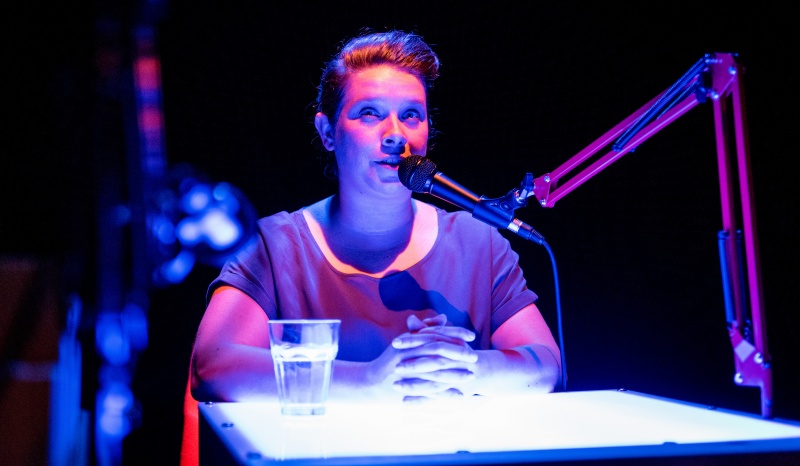
This review was written following a preview performance and therefore does not necessarily truly reflect the finished piece.
Stories to Tell in the Middle of the Night hangs on the conceit of a late-night radio show in which, rather than spinning discs, writer and solo performer Francesca Millican-Slater spins yarns.
The stories told include a romantic reconciliation by way of snobbery, how neighbourly propriety can turn exhaustive and exhausting, and what happens when a lonesome pork pie “holer” tries to be in on the joke with his factory workmates. The latter is the closest to horror the show strays, and its final sequence is hard to shake. It’s one of the better vignettes. Naturally, some stories outshine others, but unfortunately the majority of the good ‘uns come nearer the start.
Millican-Slater’s voice is perfectly pitched for the radio-style interludes between stories, soothing and sing-song, but her delivery does not vary enough in the stories. Her cadence and accent almost never changes. What she sticks with does not always work. One story, about violence, is totally robbed of any resonance because it comes late in the show, and offers no variety from what comes before.
The mood is supposed to evoke that of the early hours of the morning, creeping towards dawn, but surely few performers could want their show to be categorised as sleepy or, worse, sleep-inducing. Stories to Tell in the Middle of the Night might (affectionately) be called the former, but comes dangerously close to the latter.
What seems most apparent to me, having seen the show, is how much better this would work as a weekly fictive column, or blog, or as an actual ink-on-paper collection of short stories. Though some are duds, the earlier stories are in turns smart, and diverting, and feature enough rhetorical tricks and evocative language that what we see on stage is entirely inferior to what we hear.
Should this remain a stage show, then I would suggest that Millican-Slater invest time into adding both depth and variation to her character work, so that she might embody the stories more fully, resisting playing one “storyteller” role the whole time. Also, add more humour. Chuck in a handful of big, bold belly-laughs and complaints of an overlong runtime or repetitive material would indisputably diminish. The show is crying out for some out-and-out comedy, not just the subtle quirkiness or alliterative wordplay that populates its wheelhouse currently. The radio interludes are probably the best place to inject new laugh-lines, a la “analogue Tinder,” already a part of the show, or scrap a weaker vignette for something funnier.
One of the better tales centres on a man who comes to be known as “Moon Face” after he moves to a new area. He forces himself to walk round the streets that surround his home “in order to keep the world turning.” It’s colourful, hopeful, taps into a world we can all recognise, and has a dash of amusement. More of that, please. Will Amott 10th February 2017

